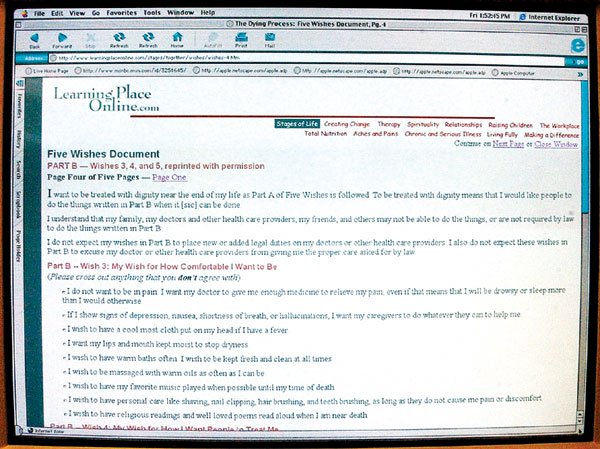Sally Leete is a healthy 51-year-old who enjoys working out,
reading and spending time with her husband. Even so, the lingering
thought of making a living will surfaced in Leete’s mind several
months ago, well before the Terri Schiavo case exploded into the
public’s consciousness.
Sally Leete is a healthy 51-year-old who enjoys working out, reading and spending time with her husband. Even so, the lingering thought of making a living will surfaced in Leete’s mind several months ago, well before the Terri Schiavo case exploded into the public’s consciousness.
“Now that I’m over 50, I believe maybe I’m actually not immortal,” said Leete, an adult program librarian at the Gilroy Library. “I wanted to make things easier for my family who survive me. I have really strong feelings about how I want my care to be if I become a vegetable, and really, I feel like we’re all one car accident away from becoming a vegetable.”
Inspired by her 87-year-old mother, who made a living will 30 years ago, Leete decided to take an introductory workshop in mid-January that addressed how to create an advance healthcare directive, a written set of instructions detailing how someone wishes to be taken care of near the end of his or her life if that person is no longer able to communicate his or her thoughts.
The class was taught by Bonnie Evans, a Gilroy resident who is certified with the Coda Alliance, a Santa Clara County-based organization with a goal to improve end-of-life care.
“An advance healthcare directive is a gift you give your family,” Evans said. “The more information you can give them, the less guilty they feel after your death, and the less they’ll need to ask themselves, ‘Did we do the right thing?’ They can go to the document and say, ‘Yes, this is what that person wanted.'”
Creating an advance healthcare directive entails two steps: first, naming a surrogate decision-maker – or person who will make healthcare decisions on your behalf – and second, discussing with that person exactly how you want to live and be taken care of in the event a chronic disease or an accident made you unable to care for yourself.
Surrogate decision-makers do not necessarily have to be spouses, children or even blood relatives. They can be good friends, church acquaintances or adopted relatives, but they must be older than 18 and cannot be your doctor, or anyone else associated with the medical facility where you receive treatment.
Decision-makers should be close to you and not afraid to speak up, Evans said.
“If they’re elderly, I usually encourage people not to name their spouse, because (being a decision-maker) requires some very hard decisions and a lot is at stake,” she said. “They have to be assertive and able to say, ‘This is not what this person would have wanted.’ They have to be willing to fight.”
For most people, naming a decision-maker is the easier part. Sitting down – first with yourself, second with the decision-maker and third with your family – to discuss the details of dying is what many find more difficult, Evans said. Questions to ask include everything from personal views on the artificial sustenance of life to whether you want make up applied before seeing visitors.
“There is so much to think about and ask yourself, and there are so many different scenarios to consider,” she said. “Obviously, with Terri Schiavo, the question was, do you want feeding tubes? That’s something you can put in writing, and if you feel strongly about it, it’s a good idea to put it in writing. Think of how much more powerful it is if the decision-maker has the document in their hands and can remember your voice saying, ‘If I have to have a tube in my stomach, and I can’t chew, swallow and enjoy my food, it’s probably time for me to go.”
Talking about preferences of dying seems a morbid subject to some. But in many cases, it’s simply a consequence of society’s tendency to shy away from the issue as a whole, said Del Foster, an attorney with Rusconi, Foster, Thomas and Wilson law firm, which serves Santa Clara, San Benito, Santa Cruz and Monterey counties.
“One of the things we don’t talk about very much in our society is death and dying,” he said. “A lot of people don’t really think through what that means, and with modern technology, there are so many gray areas.”
Over his 16 years of practice covering wills and estate planning, Foster said the vast majority of his clients request their wills include end-of-life decisions.
“The biggest reason, I think, is quality of life,” he said. “But it’s also a drain on family resources and an emotional drain on family members if those decisions are not made.”
A common misconception is that the directives require a lawyer to be valid. The forms are legal as soon as they are filled out, signed and dated, then either notarized or witnessed by two people that fulfill certain qualifications. One instance in which a lawyer might be helpful, however, is if there is a dispute within the family that may cause conflict when the person dies, regardless of the specifications of the directive.
Forms can be obtained from a number of locations, including hospitals, health clinics and – increasingly popular – online. One form Evans recommends is called Five Wishes, developed in 1998 in Florida by Aging With Dignity, a nonprofit organization.
Staff at Kaiser Permanente Santa Teresa, Saint Louise Regional Hospital in Gilroy and Hazel Hawkins Memorial Hospital in Hollister also are available to help people with the process of filling out the forms and to answer any questions.
Since the Schiavo case became so prominent, the number of people asking about directives at Saint Louise has doubled, said Pam Umann, a medical social worker.
“We have our work cut out for us, but it’s a very, very easy and simple process,” she said. “And it’s so important for people to address these subjects before they become sick. It’s the last thing you want to talk about when someone is ill. Having this conversation can feel very uncomfortable – and really long. But balance that with being on a feeding tube for years, and suddenly, it doesn’t seem so long after all.”
Create an advance healthcare directive
Code Alliance-certified Bonnie Evans will facilitate Conversation Before a Crisis, a free workshop on advance healthcare directives, from 11am to 12:30pm today, April 16, 23 and 30, at the Gilroy Library, 7387 Rosanna St.
Workshops will include instructions for completing the directives as well as provide several types of California-approved forms.
Directives completed during the workshops can be signed, dated and witnessed.
Details: Gilroy Library at (408) 842-8207.













